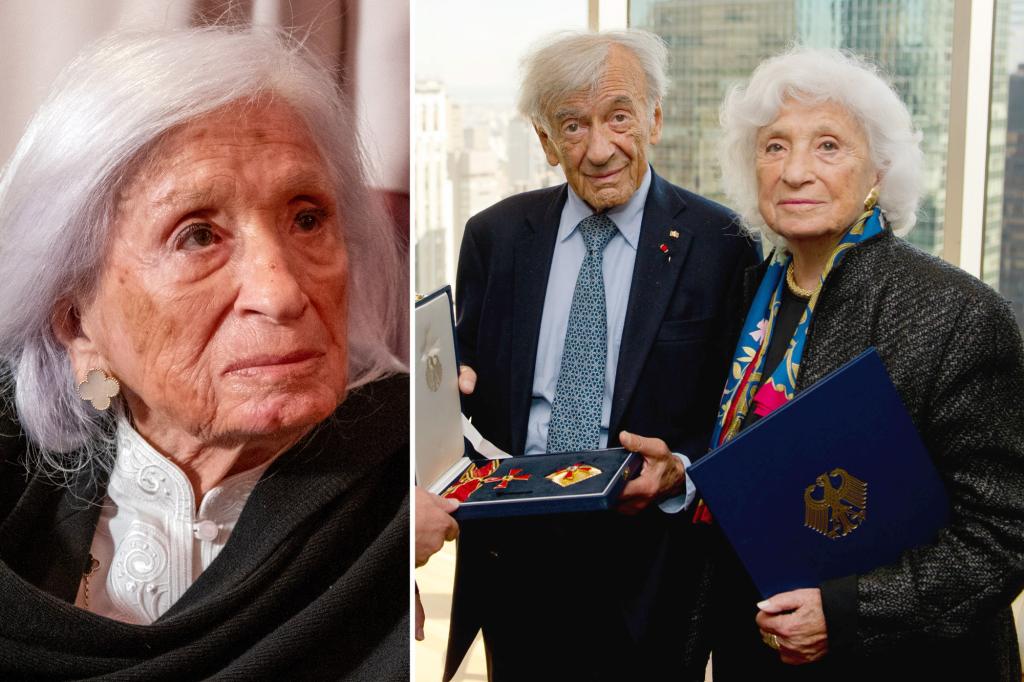Marion Wiesel, a woman of remarkable strength, resilience, and unwavering commitment to human rights, passed away on February 2nd, 2025, at the age of 94. Her life was a tapestry woven with threads of personal tragedy, profound love, and tireless advocacy. Born Mary Renate Erster in Vienna in 1931, her early years were shadowed by the looming threat of Nazism. Forced to flee her homeland with her family, she navigated the treacherous landscape of wartime Europe, eventually finding refuge in Switzerland in 1942 thanks to a relative’s Swiss citizenship. This experience, though harrowing, instilled in her a deep empathy for the displaced and persecuted, a theme that would resonate throughout her life and work. Immigrating to New York in 1949, Marion embarked on a new chapter, one that would eventually intertwine her destiny with that of Elie Wiesel, a man who, like her, bore the indelible scars of the Holocaust.
Marion’s life took a significant turn when she met Elie Wiesel, a survivor of the Auschwitz and Buchenwald concentration camps and a burgeoning author. Their shared experiences, their commitment to preserving the memory of the Holocaust, and their mutual passion for justice formed a powerful bond. They married in 1969, embarking on a partnership that would not only enrich their personal lives but also amplify their collective impact on the world. Marion became an integral part of Elie’s work, translating fourteen of his books from French to English, including a revised translation of his seminal work, “Night,” a poignant account of his experiences in the concentration camps. This act of translation was not merely a linguistic exercise but a profound act of empathy, allowing Marion to further immerse herself in her husband’s experiences and to share his powerful message with a wider audience.
Beyond her role as translator, Marion carved her own path as an activist and filmmaker. She produced and narrated the documentary film “Children of the Night,” a heartbreaking yet essential testament to the young lives extinguished during the Holocaust. This film, along with other television programs she produced, such as “A Passover Haggadah,” “The World of Elie Wiesel,” and “The Oslo Concert: A Tribute to Peace,” demonstrated her dedication to using media as a platform for remembrance, education, and advocacy. Marion’s commitment extended beyond the realm of film and literature. She played a vital role in managing the Beit Tzipora Centers in Israel, institutions dedicated to providing education and support to Ethiopian Jewish children. This work reflected her unwavering belief in the power of education and her commitment to ensuring that future generations, regardless of their background, had the opportunity to thrive.
Marion’s influence on Elie Wiesel’s life and work was profound. She is credited with contributing significantly to his rise as an internationally recognized human rights icon. Her sharp intellect, her unwavering support, and her deep understanding of his mission provided him with a steadfast anchor as he navigated the complexities of public life and the emotional toll of revisiting his traumatic past. Joseph Berger, in his biography “Elie Wiesel: Confronting the Silence,” eloquently captured Marion’s importance, stating, “In the alignment of stars that helped make Wiesel the international icon he became, his marriage to Marion was among the most significant.” Marion’s presence by his side, her unwavering support, and her shared dedication to human rights undoubtedly played a crucial role in empowering Elie to become the voice of millions.
Marion’s passing evoked an outpouring of grief and tributes from around the world. Danny Danon, Israel’s Ambassador to the United Nations, expressed his deep sadness, highlighting her unwavering commitment to memory and truth, particularly evident in her annual attendance at the UN’s International Holocaust Remembrance Ceremony. Her presence at these events served as a powerful reminder of the importance of bearing witness, of never forgetting the atrocities of the past, and of continuing the fight against injustice. The Elie Wiesel Foundation for Humanity, established with the proceeds from Elie’s 1986 Nobel Peace Prize, suggested that those wishing to honor Marion’s memory could make charitable donations to support the Beit Tzipora Centers, a fitting tribute to a woman who dedicated so much of her life to helping vulnerable children.
Marion Wiesel’s life was a testament to the power of resilience, the importance of empathy, and the enduring strength of the human spirit. From the ashes of her own displacement, she emerged as a beacon of hope, dedicating her life to ensuring that the voices of the silenced were heard and that the lessons of history were never forgotten. Her legacy lives on not only through her own work but also through the countless lives she touched, both directly and indirectly, through her tireless advocacy and unwavering commitment to a more just and compassionate world. Her partnership with Elie Wiesel created a powerful synergy, amplifying their individual efforts and leaving an indelible mark on the global landscape of human rights. Marion Wiesel’s life serves as an inspiration to us all, reminding us that even in the face of unimaginable adversity, we have the power to make a difference, to stand up for what is right, and to create a better future for generations to come.

